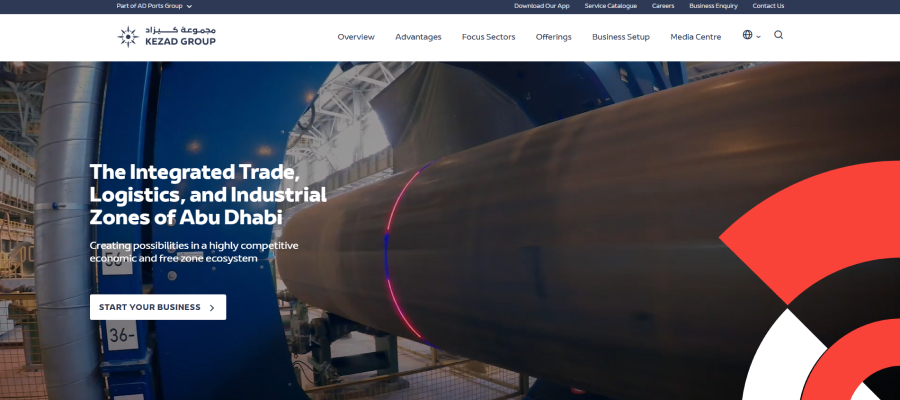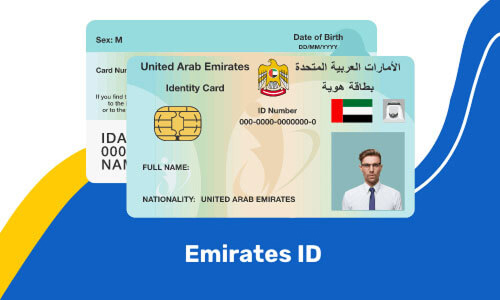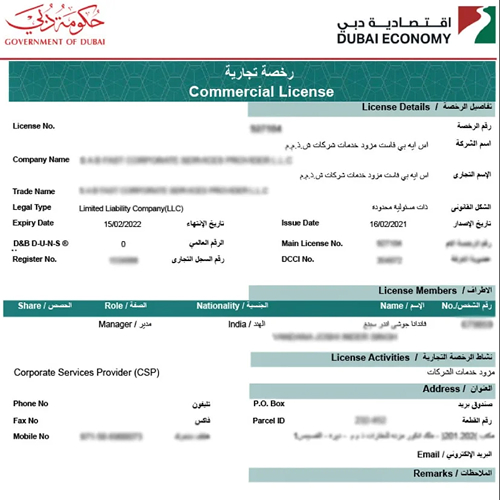Looking for the most cost-effective free zone to set up your UAE company? Khalifa Economic Zones Abu Dhabi, or KEZAD, deserves a hard look.
This isn’t a token office park. It’s huge—over 550 square kilometers—and it sits right next to Khalifa Port, which means direct access to shipping lanes that touch every corner of the world. The zone itself is fairly new, formed in 2022, when Abu Dhabi combined KIZAD and ZonesCorp under one banner. The idea was to stop scattering industries across different places and instead build a single, connected hub for logistics, trade, and manufacturing.
What you get as an investor is straightforward: full foreign ownership, no corporate or personal income tax, and the ability to repatriate profits without restrictions. But what matters just as much is the environment. Warehouses, factories, road and port links—all ready, all designed with scale in mind. KEZAD feels less like paperwork and more like a platform you can actually build on.

Why Choose KEZAD for Business Setup?
When people talk about “the right free zone” in the UAE, they often mean the one that makes their business life simpler, cheaper, and faster. Khalifa Economic Zones Abu Dhabi (KEZAD) has been designed with exactly that in mind. It isn’t just another patch of land with a few offices; it’s a massive ecosystem built for trade, logistics, and industry.
The numbers tell part of the story. KEZAD stretches across 550 square kilometers, making it one of the largest integrated economic zones in the Middle East. It’s anchored by Khalifa Port, Abu Dhabi’s deep-water container port that connects directly to Asia, Africa, and Europe. That location alone cuts time and cost for companies moving goods in and out of the UAE. Add in road access to both Abu Dhabi and Dubai, and soon the Etihad Rail link, and you’ve got multi-modal transport baked into the zone itself.
But it’s not just geography. Investors choose KEZAD free zone because it offers the benefits international businesses now expect:
- 100% foreign ownership
- 0% corporate and personal income tax
- Full repatriation of capital and profits
- No customs duty on re-exports
- Long-term land leases (up to 50 years)
In practice, this means companies don’t spend months stuck in paperwork or years stuck in inflexible leases. The zone is structured to give you options—small warehouses, massive factories, office space, or a mix of all three. You can scale without having to move out.
And for those not ready to board a plane? KEZAD, like other leading UAE zones, has built remote registration pathways. Identity checks can be handled digitally, documents can be processed through agents, and your business can be legally established before you even set foot in Abu Dhabi.
About KEZAD
KEZAD free zone is a relatively new name, but not a new idea. In 2022, Abu Dhabi merged KIZAD (Khalifa Industrial Zone) and ZonesCorp, the emirate’s two big industrial platforms, under one brand. The move was more than rebranding—it was about consolidation. Instead of splitting industries between two separate authorities, KEZAD brought them together under the umbrella of AD Ports Group, the government entity that also operates Khalifa Port.
This matters. With help from the government, KEZAD is stable and has a clear sense of its future. Abu Dhabi's leaders have made it clear that they want to move away from oil, and KEZAD is a key part of their plan. The zone isn't a side project; it's part of the country's overall plan.
In the UAE market, that positioning makes KEZAD the industrial powerhouse of Abu Dhabi. While Dubai has JAFZA and DMCC for trade, Abu Dhabi now has KEZAD for logistics and manufacturing. Its specialized clusters—like the KEZAD Food Zone—also show how it’s tailoring infrastructure to industries that need more than just land.
Business Activities Allowed in KEZAD
KEZAD’s licensing scope is broad but focused. Unlike twofour54, which is aimed at media, KEZAD was built to host industrial, logistics, trading, and service companies. That includes:
- Manufacturing and processing industries – metals, chemicals, building materials, plastics, automotive assembly.
- Food and agriculture – the KEZAD Food Zone caters specifically to food storage, processing, and packaging.
- Logistics and warehousing – companies that need large storage and distribution hubs benefit from direct port access.
- Trade and commercial activities – import, export, and re-export operations.
- Service activities – from consultancy tied to industry to support services like maintenance and repair.
Some things need to be approved ahead of time. Heavy industry that uses chemicals or energy, for instance, might need permission from the environment. Health authorities often need to give food-related businesses extra approvals.
What sets KEZAD apart is scale. A media company may need an office; a logistics firm may need ten hectares of warehousing. KEZAD is one of the few free zones in the UAE that can accommodate both ends of that spectrum without compromise.
Step-by-Step KEZAD Freezone Company Formation and Registration
Setting up in the UAE can feel overwhelming the first time around—too many forms, too many offices, and too many acronyms. The process inside KEZAD free zone, though, has been designed to cut out most of that noise. Think of it less like a bureaucratic maze and more like a sequence of boxes you tick off. Once you understand the structure, the rest flows.
The first step is choosing the right legal structure. KEZAD offers several forms of companies for registration—each one matching a different type of investor. You can establish a Free Zone Limited Liability Company (FZ-LLC) with one or more shareholders, register a branch of a foreign company, or set up a branch of a local UAE company. For industrial players, the LLC is the most common, but branches are popular for international firms that just want a footprint without reinventing themselves legally.
Once that’s clear, you move into documentation—proof of who you are and proof of what your company is. That’s where most first-time applicants get caught, not because the requirements are complex but because missing one page can slow everything down.
Required Documents and Timeline
KEZAD looks at both the personal side and the corporate side. On the personal side, you’ll need:
- A valid passport copy
- Passport-sized photographs
- A recent utility bill or rental contract to prove address
- An entry permit or Emirates ID if you’re already in the UAE

On the corporate side, the documents of the company itself are also required. This includes:
Memorandum and Articles of Association (MoA & AoA) – required both for newly registered FZ-LLCs and for branches, as they define the company’s governance and shareholding
Certificate of Incorporation (if registering a branch or corporate shareholder)
A Board Resolution if you’re setting up a branch
Depending on the activity, a simple business plan or feasibility study
Once everything is in, KEZAD’s team reviews the application. The initial approval can often be issued within five working days. The final license and company registration certificates typically take two to three weeks, though industrial setups needing external approvals may take longer. Compared to many international jurisdictions, that’s quick—you can go from idea to legally operating entity in less than a month.
This efficiency is one of KEZAD’s selling points. For entrepreneurs, time lost in paperwork is time you can’t spend building your business. For multinationals, speed matters because contracts and supply chains can’t wait months for a new entity to appear.

Want to learn more about UAE business setup services?
Remote Registration Option
Now, here’s where KEZAD shines for global investors. You don’t have to fly to Abu Dhabi to start your company. KEZAD free zone registration can be completed remotely, thanks to digital processes and licensed agents.
Identity verification is usually handled through a video call. During the call, you show your passport and any other ID documents, which are verified in real time. Applications can be signed digitally, and only a handful of originals—if needed—have to be sent by courier. Agents based in Abu Dhabi can represent you for the local steps, ensuring you’re compliant without ever leaving your desk.
For entrepreneurs based in Europe, Asia, or North America, this saves weeks of disruption. You avoid flights, hotels, and days off your schedule. For small teams, it’s a cost-saver; for large corporates, it’s simply efficient.
Remote setup doesn’t mean you’re left alone, either. KEZAD assigns support staff and works with consulting partners who guide you through each stage, from the license choice to VAT registration. In effect, you get the same outcome—a registered KEZAD company with a valid license and visas—but with a smoother path to get there.
Setting up in KEZAD is not about battling forms; it’s about choosing the right structure, preparing the right documents, and letting the zone’s streamlined system handle the rest. KEZAD makes starting a business less like a hassle and more like an opportunity by giving you a number of company formation options, quick approvals, and the ability to register your business from anywhere.
Types of Licenses and Costs in KEZAD Freezone
When people think of KEZAD, they picture warehouses, cranes, and factories—and that’s not wrong. But at the core of any KEZAD company setup is something simple: your license. Without it, you’re just renting space. With it, you’re a registered business plugged into Abu Dhabi’s industrial backbone.
KEZAD offers four main licenses, and each one reflects the type of work the zone was built for:
- Industrial license – the big one, covering factories, processing plants, and large-scale production. Metals, chemicals, automotive—this is where heavy industry gets a home.
- Trading license – for import, export, and re-export. It’s about moving goods, whether containers full of steel or pallets of food.
- Service license – for the quieter but essential players: consultants, repair specialists, supply-chain services.
The cost of a KEZAD license isn’t a flat sticker price. It’s more like building a custom package: license fee + workspace + visas. You choose the scale, and the number changes. That’s the flexibility here—you don’t have to buy a bundle that doesn’t fit your business.

Trading license
Visa Packages and Pricing Breakdown
Visas are where costs get real. Every employee you bring in needs one, and your license and space determine how many you’re allowed. A flexi-desk might get you one visa. A small warehouse could unlock three or four. Larger offices or industrial plots can support entire teams.
Here’s the usual pattern:
- Solo setup – license, flexi-desk, and one visa.
- Small team – license, modest office or unit, and 2–4 visas.
- Growing company – license, larger space, 5+ visas.
On top of that, there are extras: e-channel registration (a must in Abu Dhabi), visa stamping fees, medical tests, and Emirates IDs. These aren’t huge individually, but they add up if you’re bringing in a full team.
And if you don’t see a neat “package” advertised? Don’t panic. KEZAD works case by case. You tell them what you need—five people, one warehouse, trading license—and they price it out. It’s less of a menu and more of a tailor-made quote.
That’s why many businesses lean on consultants: they translate your plans into a clean cost breakdown so you’re not surprised halfway through.
KEZAD Corporate Tax, VAT, and Duties
Nobody likes tax talk, but you can’t ignore it. The good news is that the KEZAD free zone keeps things simple.
Here’s the big headline: no corporate or personal income tax if you stay within the rules. When the UAE introduced its corporate tax in 2023—9% on profits over AED 375,000—many people panicked. But KEZAD, like other recognized free zones, still gives companies a way to keep that 0% rate. The catch? You have to stick to your licensed activities and file reports properly. If you treat compliance seriously, the tax-free promise holds.
VAT is another layer. The UAE charges 5% Value Added Tax on most goods and services. If your KEZAD company makes more than AED 375,000 in taxable supplies a year, registration is mandatory. Below that, it’s optional—but many businesses register anyway because it makes dealing with bigger, VAT-registered clients easier.
Customs are where KEZAD shines. Goods stored, processed, or re-exported from the zone? No duties. Move them into the UAE mainland, and regular tariffs apply. For manufacturers and logistics firms, this can mean real savings on everyday operations.
The truth is, these benefits aren’t automatic. They come with conditions: proper books, annual audits, and VAT returns filed on time. You mess up, and the benefits go away quickly. That’s why many companies lean on Consulting.ae—to handle the fine print so the business owner can stay focused on growth.
KEZAD Company Formation: Who Should (and Shouldn’t) Choose This Free Zone?
KEZAD is massive, but it isn’t for everyone. The zone was built with a clear purpose: industry, trade, and logistics on a scale few other free zones can match. If that’s your game, you’ll feel right at home. If it isn’t, you might be better off elsewhere.
Who KEZAD works well for
- Manufacturers – steel, plastics, chemicals, automotive, food processing. KEZAD was designed for factories.
- Traders and distributors – import, export, re-export, bulk goods. Its direct link to Khalifa Port makes trade smoother and cheaper.
- Logistics and warehousing companies – if you need storage or regional distribution, the infrastructure here is unmatched.
- Large corporates – firms looking for long-term land leases and integration into global supply chains.
Who might struggle here
- Freelancers and solo consultants – KEZAD isn’t built for a one-person creative business. Other zones (like twofour54 or IFZA) fit that profile better.
- Retail shops targeting the UAE mainland – a KEZAD license doesn’t give you onshore retail rights; you’d need a distributor.
- Small service firms with no link to industry – you’ll find yourself isolated in an industrial ecosystem.
- High-risk nationalities – some passports face additional screening or restrictions, a reality across UAE free zones.
- Anyone wanting to avoid VAT entirely – once your revenue passes AED 375,000, registration is mandatory.
Bottom line: KEZAD is for businesses that move goods, build things, and run supply chains. If your business lives in pixels or paper, this isn’t your zone.
Conclusion
The KEZAD free zone isn’t just another free zone with a shiny brochure. It’s huge, it’s connected straight into Khalifa Port, and it was built with one clear goal: to give manufacturers, traders, and logistics firms the space and infrastructure to actually grow. If your business is about moving goods or building things, KEZAD makes sense.
The advantages aren’t fluff—they’re practical. No corporate or personal tax. Full foreign ownership. The ability to ship in raw materials, process them, and re-export without customs duties eating into your margins. Long-term leases mean you can plan for decades, not just a year or two.
If KEZAD feels like your fit, don’t stumble through the setup alone. The forms, VAT registration, and compliance rules can be a headache if you’re new. Get help, get it right the first time, and then spend your energy where it matters—running the business you came here to build.
Yes. KEZAD allows full remote registration with video verification and couriered documents.
Generally no; fees are paid upfront, though banks sometimes help with staged payments.
Yes. International trade is permitted; mainland retail requires a distributor.
Heavy industry, chemicals, and food processing often need extra clearances.
